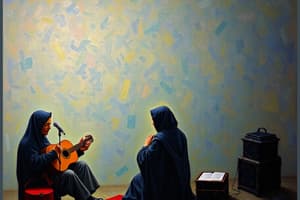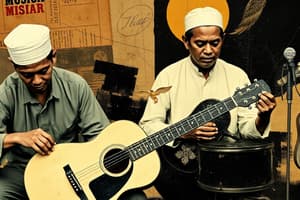Podcast
Questions and Answers
Islamic music in Mindanao reflects the diverse religious and ethnic influences that have shaped the region's ______ over centuries
Islamic music in Mindanao reflects the diverse religious and ethnic influences that have shaped the region's ______ over centuries
identity
The history of Islamic music in Mindanao can be traced back to the arrival of Islam in the region around the ______ century
The history of Islamic music in Mindanao can be traced back to the arrival of Islam in the region around the ______ century
16th
Muslims settled in various parts of Mindanao brought with them their rich musical traditions, which blended with existing indigenous music to create a unique cultural ______
Muslims settled in various parts of Mindanao brought with them their rich musical traditions, which blended with existing indigenous music to create a unique cultural ______
fusion
Al-Hamdu Lillah, or 'Praise be to God,' is one of the most popular forms of Islamic music in Mindanao, typically performed in large gatherings during religious ______
Al-Hamdu Lillah, or 'Praise be to God,' is one of the most popular forms of Islamic music in Mindanao, typically performed in large gatherings during religious ______
Zikir, also known as 'dhikr,' refers to the recitation of specific phrases or sentences from the Quran and ______
Zikir, also known as 'dhikr,' refers to the recitation of specific phrases or sentences from the Quran and ______
In Mindanao, zikir groups often hold regular meetings in mosques or private homes to practice this form of ______
In Mindanao, zikir groups often hold regular meetings in mosques or private homes to practice this form of ______
Gong saunto, also known as 'gumangsa,' is another genre of Islamic ______ in Mindanao that features the use of gongs and drums.
Gong saunto, also known as 'gumangsa,' is another genre of Islamic ______ in Mindanao that features the use of gongs and drums.
Magunaw, also called 'magunwahan,' is a type of performance art that combines song, dance, and ______.
Magunaw, also called 'magunwahan,' is a type of performance art that combines song, dance, and ______.
Takbir refers to the vocal expression of 'Allahu Akbar,' which translates to 'God is ______.'
Takbir refers to the vocal expression of 'Allahu Akbar,' which translates to 'God is ______.'
Islamic music plays a significant role in the social and cultural life of Mindanao's diverse ______ communities.
Islamic music plays a significant role in the social and cultural life of Mindanao's diverse ______ communities.
Flashcards are hidden until you start studying
Study Notes
Islamic music is deeply rooted in the cultural fabric of Mindanao, the southern region of the Philippines. It is an integral part of traditional Filipino music, reflecting the diverse religious and ethnic influences that have shaped the region's identity over centuries. This article explores the history, genres, and significance of Islamic music in Mindanao.
History of Islamic Music in Mindanao
The history of Islamic music in Mindanao can be traced back to the arrival of Islam in the region around the 16th century. As Muslims settled in various parts of Mindanao, they brought with them their rich musical traditions, which blended with existing indigenous music to create a unique cultural fusion. This mixing of musical genres gave rise to a vibrant and diverse Islamic music scene in Mindanao.
Genres of Islamic Music in Mindanao
Al-Hamdu Lillah
Al-Hamdu Lillah, or "Praise be to God," is one of the most popular forms of Islamic music in Mindanao. It is typically performed in large gatherings during religious festivals such as Hajj. The lyrics of al-Hamdu Lillah often express gratitude for blessings received and seek divine guidance and protection.
Zikir
Zikir, also known as "dhikr," refers to the recitation of specific phrases or sentences from the Quran and Hadiths. It is a form of devotional prayer that serves as a means to remember and contemplate upon the teachings of Islam. In Mindanao, zikir groups often hold regular meetings in mosques or private homes to practice this form of music.
Gong Saunto
Gong saunto, also known as "gumangsa," is another genre of Islamic music in Mindanao that features the use of gongs and drums. This genre originated among the Maranao people and is traditionally played at weddings, funerals, and other community events.
Magunaw
Magunaw, also called "magunwahan," is a type of performance art that combines song, dance, and poetry. It is particularly popular among the Yakan and Sama communities in Basilan Island. Magunaw performances often revolve around themes of love, nature, and social issues, reflecting the concerns and aspirations of the performers.
Takbir
Takbir refers to the vocal expression of "Allahu Akbar," which translates to "God is great". It is used as an expression of praise and gratitude to God during various religious activities such as prayers and celebrations. The takbir is also a common element in the call to prayer, which is broadcast five times daily throughout Mindanao.
Significance of Islamic Music in Mindanao
Islamic music plays a significant role in the social and cultural life of Mindanao's diverse Muslim communities. It fosters a sense of unity and shared identity among Muslims and helps to preserve their cultural heritage. Furthermore, it serves as a means of expressing spirituality and seeking divine guidance, providing comfort and strength in times of need.
In conclusion, Islamic music has been an integral part of the cultural landscape of Mindanao for centuries. Its rich diversity reflects the region's unique blend of religious and ethnic influences and serves as a testament to the resilience and adaptability of its people. As the world continues to embrace cultural diversity, the significance of Islamic music in Mindanao becomes even more apparent, offering a glimpse into the rich tapestry of Filipino culture and tradition.
Studying That Suits You
Use AI to generate personalized quizzes and flashcards to suit your learning preferences.




